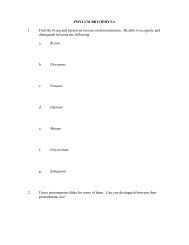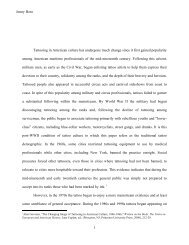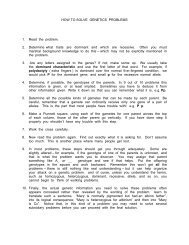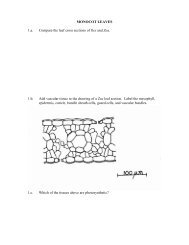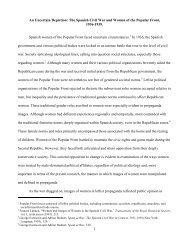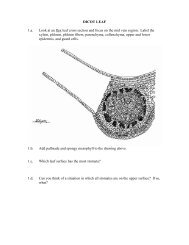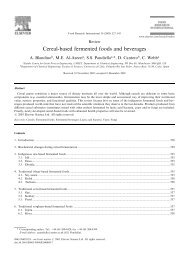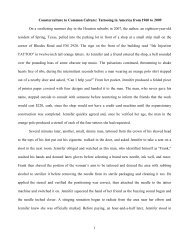Meat - Facing the Dilemmas
Meat - Facing the Dilemmas
Meat - Facing the Dilemmas
You also want an ePaper? Increase the reach of your titles
YUMPU automatically turns print PDFs into web optimized ePapers that Google loves.
The Business PageIndustry benefits ifregulators learn fromBSEPatrick van Zwanenbergand Erik MillstoneOne calamity seems to follow ano<strong>the</strong>r in <strong>the</strong>meat industry: BSE, foot and mouth disease(FMD), bluetongue, and <strong>the</strong> threat of birdflu. The reasons <strong>the</strong>se disasters present suchprofound challenges lie partly in <strong>the</strong> practicesof modern agriculture and food production –which may cause and exacerbate <strong>the</strong> scaleand seriousness of disease outbreaks – butalso depend on how government and industryhave responded to <strong>the</strong>se threats.The policy mistakes that contributed to <strong>the</strong>BSE saga have rightly been subjected toa searching public inquiry and sustainedeffort by <strong>the</strong> UK government to reformsome aspects of <strong>the</strong> ways in which policiesare made and justified. They needed to be.Mistakes meant that we took considerablylarger risks to human health from BSE thanwe should have done. The mistakes adverselyaffected consumer confidence and trust ingovernment, livestock farming, and <strong>the</strong> meatproducts industry. That lack of trust spilledover and affected consumer attitudes to arange of o<strong>the</strong>r food issues, notably aroundinnovations in agricultural biotechnology.Consumer trust depends not just onconfidence in <strong>the</strong> expertise of advisors and<strong>the</strong> competence of policy-makers, but also onconfidence that advisors and policy-makersput consumers’ interests first.As one of <strong>the</strong> aims of food regulation is toengender consumer trust in <strong>the</strong> productsprovided by <strong>the</strong> private sector, one mighthave thought that <strong>the</strong> food industry would beparticularly keen to ensure that government’sregulatory reforms did not fall short ofexpectations. But, as on-going problems withfood safety policy demonstrate, that is justwhat has happened.The decision to create <strong>the</strong> Food StandardsAgency (FSA) in April 2000 was, in part,a decision to separate regulation fromsponsorship in respect of food safety. Butthree key areas of UK agricultural and foodpolicy-making remained unreformed, namelyBSE, pesticides and veterinary medicines.The continued lead role over BSE, first byMAFF and later DEFRA, is bizarre. It istantamount to maintaining <strong>the</strong> pretence thatBSE is primarily a veterinary problem ra<strong>the</strong>rthan an issue of human health. DEFRAshould be developing agricultural policywithin a regulatory framework that isconcerned with public health and set by <strong>the</strong>FSA, ra<strong>the</strong>r than <strong>the</strong> FSA struggling to dealwith public health within <strong>the</strong> parameters setby DEFRA’s approach to agriculture.By <strong>the</strong> same logic, primary responsibilityfor policy on pesticides and veterinarymedicines should also be transferred to <strong>the</strong>FSA. The FSA is supposed to represent andprotect <strong>the</strong> interests of consumers, while <strong>the</strong>Veterinary Medicines Directorate (VMD)sees drug companies as its customers, and<strong>the</strong> majority of members of <strong>the</strong> VeterinaryProducts Committee have numerouscommercial and consultancy interests in <strong>the</strong>companies manufacturing and marketingveterinary medicines. The VMD has alsobecome increasingly dependent on <strong>the</strong>animal drug companies for its funding.One example of <strong>the</strong> consequences: <strong>the</strong>Soil Association has criticised <strong>the</strong> VMDfor doing <strong>the</strong> bidding of <strong>the</strong> animal drugindustry when it revised its proposals soas to allow <strong>the</strong> veterinary drug companiesto advertise prescription-only productsdirectly to farmers, despite <strong>the</strong> provisionsof an EU directive prohibiting that practice.It is now clear, in <strong>the</strong> wake of <strong>the</strong> mostrecent FMD debacle, that veterinarymedicines can harm veterinary health and<strong>the</strong> livelihoods of livestock farmers, as wellas public and environmental health. DEFRAand <strong>the</strong> VMD are not protecting consumers,livestock or <strong>the</strong> long-term interests of <strong>the</strong>livestock and meat industries.One of <strong>the</strong> most acute problems withBSE policy-making was that scientificuncertainties were not always disclosed,not just to <strong>the</strong> public but even to ministersand some senior officials. This meant thatministers were sometimes unaware of <strong>the</strong>scope for precautionary decision-making orthat public policy decisions were in practicebeing taken by expert advisors ra<strong>the</strong>r thanministers. In response, <strong>the</strong> Food StandardsAgency recommended in 2002 that allits expert advisory committees shouldconduct <strong>the</strong>ir business in open sessions.It insisted that unorthodox and contraryscientific views should be considered, andthat advisory committees should alwaysprovide a clear audit trail showing how andwhy <strong>the</strong>y reached <strong>the</strong>ir decisions, wheredifferences of opinions had arisen, andwhich assumptions and uncertainties wereinherent in <strong>the</strong>ir conclusions.The FSA rules do not apply to o<strong>the</strong>rgovernment departments and agencies.DEFRA’s rules and procedures, forexample, continue to exempt <strong>the</strong> VMD and<strong>the</strong> Pesticides Safety Directorate, and <strong>the</strong>iradvisory committees, from proper scrutinyor accountability.Even where <strong>the</strong> rules do apply <strong>the</strong>y needfollowing. Recently assessing new evidenceindicating that mixtures of artificial coloursand a preservative adversely affectedchildren’s behaviour, one problem at <strong>the</strong>FSA was that <strong>the</strong> advisory committeefailed to follow those procedural rules, and<strong>the</strong> FSA’s Board and its officials failed tonotice.Some lessons have been learnt from BSE butmostly just <strong>the</strong> easy ones. Sponsorship andregulation are still not properly separated,and science and politics are entangled inways that hide decision-making from duescrutiny, and that undermine ministerialresponsibility for making policy choices. Itis in <strong>the</strong> food industry’s long term intereststo persuade ministers and officials thatreform must go fur<strong>the</strong>r.Patrick van Zwanenberg is a Research Fellow at <strong>the</strong>Science Policy Research Unit, University of Sussex.p.f.van-zwanenberg@sussex.ac.ukErik Millstone is a Professor of Science Policyat <strong>the</strong> University of Sussex, who combines hisscholarly studies with an active engagementin food policy debates.e.p.millstone@sussex.ac.ukNext issue - March 2008WaterIf our food is too thirsty...To receive your copy subscribe now atwww.foodethicscouncil.orgwww.foodethicscouncil.org | Volume 2 Issue 4 | Winter 2007 21



